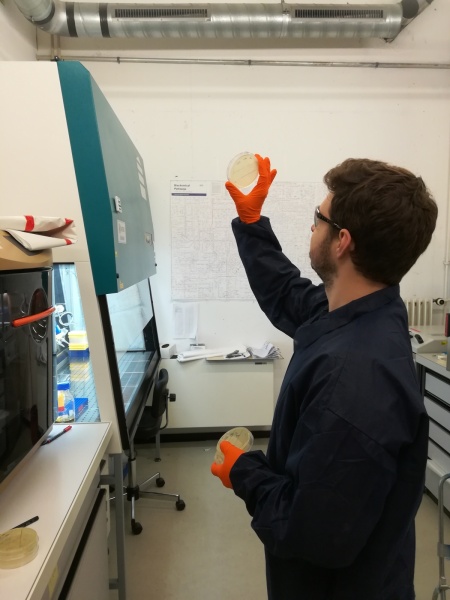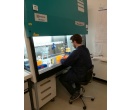Working visit to Swiss Federal Institute of Technology- EPFL
During the visit to the Swiss Federal Institute of Technology in Lausanne (EPFL, Switzerland), Łukasz Richter carried out research in Prof. Francesco Stellacci’s group. The main goals of the working visit were 1) to get familiar with techniques of synthesizing and analyzing gold nanoparticles and 2) to analyze the influence of these nanoparticles on bacteriophages (viruses that attack bacteria).
Łukasz Richter learned about different methods of creating nanoparticles covered with a single type of ligand or mixture of ligands. The main aspects of his training were, among many: research in literature and synthesis, purification and analysis of properties of nanoparticles. One of the most important aspects of his internship was the determination of virustatic or virucidal properties of different nanoparticles against bacteriophages.
Moreover, except for nanoparticles, also cyclodextrins were tested against bacteriophages. Cyclodextrins are biocompatible and FDA approved, thus they are great candidates for additives in many products and processes. Besides classical cyclodextrins, also specially modified ones were used in the experiments.
Performed research revealed nanoparticles and cyclodextrins with virustatic and virucidal properties. These results are the beginning for further studies that will be held jointly by IPC PAS and EPFL. Additionally, the problem of physicochemical interactions between different types of nanoparticles and bacteriophages is of great importance but is still poorly addressed. Therefore, it is a great opportunity for collaboration with such research group as the Department of Physical Chemistry of Biological Systems in our Institute. Thus, this trip resulted not only in interesting experimental results but also in much potential future cooperation with a world-class scientific facility.
Visitor
Łukasz Richter
Dates
Feb 12-Mar 10, 2018
Location
EPFL - Swiss Federal Institute of Technology Lausanne, Switzerland




